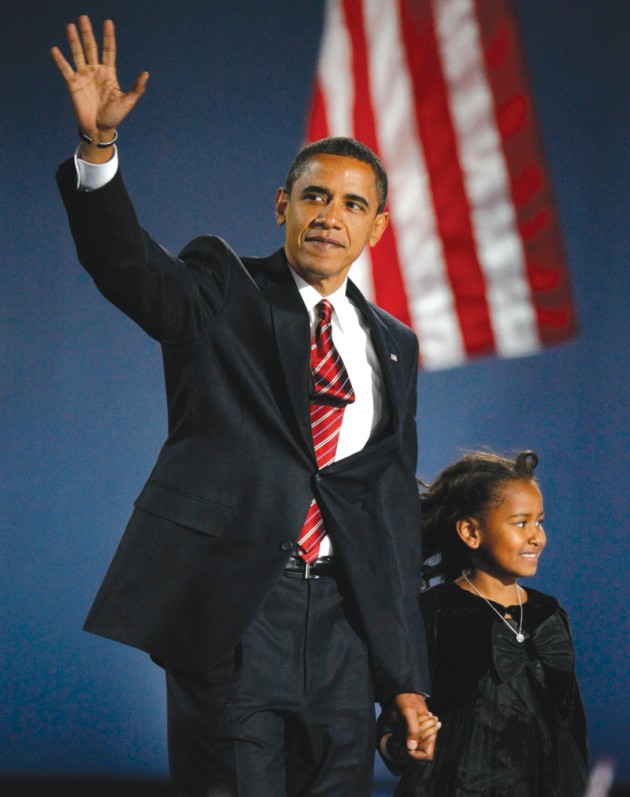OBAMA WINS PRESIDENCY

Americans seeking relief from Wall Street’s collapse, widespread foreclosures and swelling unemployment propelled Sen. Barack Obama to win the presidential race Tuesday in a sweeping victory that also marked the election of the nation’s first black commander in chief.
Obama crushed Republican contender Sen. John McCain with a projected 338-to-141 electoral vote margin at press time, sinking key battleground states Florida, Pennsylvania and Ohio. The numbers were similar around the University, with 456 of the 659 presidential ballots cast going to Obama at an on-campus polling station. (See related story.)
One political scientist said the results reflect the Obama camp’s efforts to reach out to young and minority voters and follow up beyond registration drives. Around USF, students and Obama activists poured out of the Marshall Student Center chanting “Obama! Obama!” and dancing to celebrate the longtime community organizer’s victory.
“It’s about time. I’m speechless,” said Mara Latorre, a sophomore majoring in international studies. “I wanted it to happen, but I wasn’t sure because there were so many McCain supporters.”
Meanwhile, McCain supporters were demure, with most declining comment.
Blake Kimble, an undeclared freshman, is worried about the future.
“I knew McCain could have won,” he said. “I am not optimistic.”
Susan MacManus, distinguished professor of political science at USF, said Obama’s victory is largely because of outreach efforts to untapped demographics. Also, she said, the economy drove voters young and old to the polls. Though she said initial exit polls show that youth turnout was somewhat lower than expected, it was a cohesive vote, and the demographic overwhelmingly favored Obama.
“It was always jobs, jobs, jobs for young voters,” she said. “It was more homes and foreclosures for young families, and for baby boomers about their pension and retirement.”
Indeed, Obama said to these disenfranchised and dissatisfied Americans in his victory speech that “change has come to America.” He also stressed national unity, saying the country isn’t one of red or blue states or just individual people.
“We are and always will be the United States of America,” he said.
In his concession speech, McCain congratulated Obama, calling the election historic and recognizing its importance for blacks. He asked his supporters to look beyond their problems with the liberal Democrat and support Obama.
“Senator Obama and I have had and argued our differences, and he has prevailed,” he said.
“I urge all Americans who supported me to join me in not just congratulating him but offering our next president our good will.”
The Illinois senator was a relative unknown several years ago, becoming a household name in the U.S. only after delivering a watershed speech at the 2004 Democratic National Convention.
It was a speech that told of longing, long shots and human potential — of the son of a Kenyan goat-herder turned international student and a corn-fed Kansas girl. His parents told him he could become anything, because humble beginnings like his didn’t stop people from achieving in America.
Apparently not even from becoming president elect.
He rallied masses — targeting disenfranchised voters and youths itching for political recognition — on a platform of change and hope, promising relief to a reeling middle class. Obama also made it a point to push for health-care reform and extend coverage to all Americans by way of the in-place insurance system.
McCain, on the other hand, campaigned with the experience card, touting his 22 years in Congress as reform-oriented. But his familiarity with Capitol Hill might have been the Vietnam POW and war hero’s Achilles’ heel with the American electorate. Voters increasingly associated the GOP ticket with President George W. Bush, who by the USA Today/Gallup poll estimate is the most unpopular president in the last 70 years.
In the end, Obama’s promise of change trumped McCain’s self-proclaimed maverick antics.
Obama’s win also marks a move toward more political attention on the black community, said Cheryl Rodriguez, Institute on Black Life director.
“It means that we will have a president for the first time who is standing on a platform of unity for all people,” she said. “It’s important for all people to realize that just as presidents of the past have tried to reach out to all people, I think that Barack Obama will do the same.”
On the flip side, Obama’s rise to power — which came with the collapse of Sen. Hillary Rodham Clinton’s presidential campaign in the primaries — and McCain’s defeat — which also prompted that of running mate Alaska Gov. Sarah Palin — does not mark neglect of women’s issues on the national stage, said Kim Vaz, women’s studies chair.
“We need a feminist in the White House, not a female in the White House,” she said. “That can be a man, woman — anybody.”
News editor Amy Mariani and staff writer Hannah Feig contributed reporting. Information from The Associated Press was used in this report.






